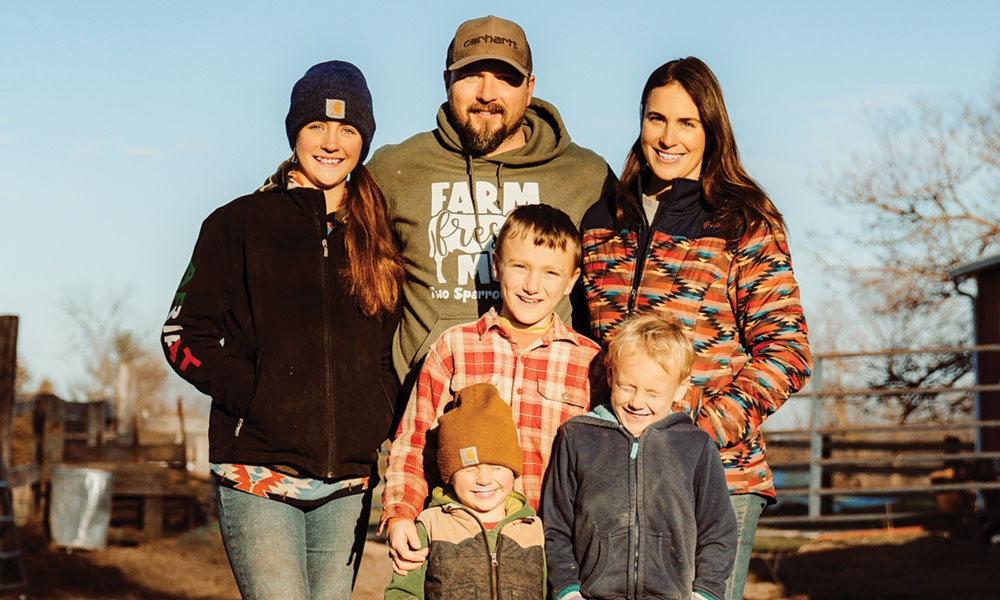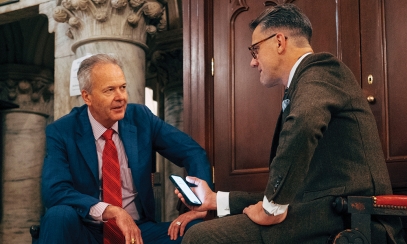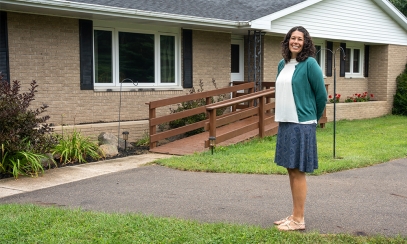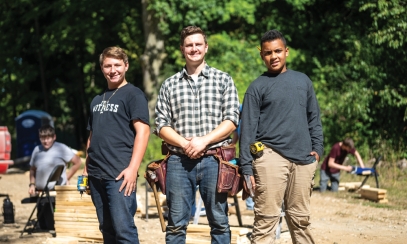
Farming and Faith: A Match Made in Heaven
“Are not two sparrows sold for a small coin? Yet not one of them falls to the ground without your Father’s knowledge. Even all the hairs of your head are counted. So do not be afraid; you are worth more than many sparrows.” (Mt 10:29-31)
“Are not two sparrows sold for a small coin? Yet not one of them falls to the ground without your Father’s knowledge. Even all the hairs of your head are counted. So do not be afraid; you are worth more than many sparrows.” (Mt 10:29-31)
Two Sparrows Farms, named for God’s promise to care for his sons and daughters, has provided abundant evidence that God is faithful to his word. Owners Dan and Whitney Belprez have grown their farm and family while holding to the truth that God provides through every trial and triumph.
With a “normal” suburban childhood, Dan says it was his mom’s faith and dedication to their family time that inspired him to seek a career that would allow him to spend his days with his wife and children. “My mom worked in Catholic schools, and having summers and holidays off is what allowed her to really put a strong emphasis on family time together. So, I initially went to college to study education.”
Like Dan, Whitney had no exposure to farming as a child, but she was always captivated by nature and dreamed of becoming a veterinarian. After meeting in high school and then attending Grand Valley State University together, Whitney says their experiences and interests led them to learn more about their food sources and the small steps they could take to care for Creation. “I interned at a small organic farm, and Dan worked at an orchard. We became very interested in organic food and started reading and learning more.”
Dan remembers that God was drawing the couple into a deeper faith life. “My family has this overarching Catholic identity and culture, so no matter where we are individually, there is still that unifying force.”
And, while Whitney’s family wasn’t religious when she was young, the example of Dan’s family became a powerful witness to her. “His mom was very inspiring in my faith journey. She was one of the first people I met who truly lived her faith not just on Sundays — she walks the walk. Her faith informs every decision.”
After Whitney entered the Catholic Church in 2008, the couple married and graduated, then Dan took a job at a large, conventional dairy farm. “I liked the work but not the production method,” he says. “I started to think we might be able to do this differently.”
Dedicated to regenerative agriculture, Whitney explains that they aim to farm their land in a way that’s always improving it.
“Compost manure is the only fertility we add to the land. We farm in unison with nature instead of in opposition to it. We rotate our cows on pasture every 24 hours from April to December. We honor the cow as an herbivore and steward the land in the best way possible.”
The couple took their first step into farming by renting 10 acres of land. “We had meat (chickens and sheep) and started canning food and buying from local farmers’ markets,” Whitney recalls.
They then purchased a 12-acre farm and launched their new business — grass-fed beef and dairy cows. In 2017, Dan and Whitney moved to a 40-acre farm and quickly outgrew it as word spread and their business expanded. The following year, they bought their current farm, which consists of 80 acres on which they raise their dairy cows for herd shares, along with beef and pork.
“Farming was initially how we sought to integrate faith and family into this life where we could spend our days together,” Dan explains. Now raising their four children on the farm, the couple is grateful for the ups and downs they experience.
“Every decision, we look through the lens of what’s best for our family and how we should be treating the land and discerning all of it. We could do more on this land, but our kids are relatively young, and we want to enjoy them and not have them resent the farm. We don’t assume they’ll all end up farming, but they know where their food comes from and how it got here. And they know how to work hard.” Whitney agrees: “Our three-year-old comes out to milk no matter the weather. His ‘pay’ is the hot chocolate packet he brings out in his mug so he can pick the cow he wants to milk. Our kids have been a part of this their whole lives. Their definition of ‘normal’ may differ slightly from most kids. We try to keep them away from electronics, and instead, they play with horses, calves and ATVs, and they explore and make forts.”
Whitney explains that the driving factor in the life of the family and the farm is the faith that brought them to step into this life years ago: “The first place we encounter God is in the family, so we’re always asking ourselves how we reflect that in the family. The home is the center of our family and livelihood, not just for consumption. We talk about decisions in front of the kids because we want them to see that their values and faith should drive them, not what’s easiest or most convenient. Ultimately, farming is a journey of faith. There’s so much out of your control — it smacks you in the face. I can’t control when the rain comes. Farming is the best spiritual teacher; you have to relinquish the feeling that you can control and learn to roll with it.
“Our kids know what sacrifice looks like, and that oftentimes we need to put other needs over ours. Love sometimes means something else has needs, and I’m here to help. This is the reality of farming: on Christmas mornings, our kids open presents and then we milk for three hours, or on any given day, breakfast might have to wait because a calf is being born.”
Dan adds, “We’ve all had such an opportunity to learn virtue: perseverance and patience, especially when things aren’t going well, and having gratitude when things are going well. The land teaches us the way things are by nature, God’s design is undeniable and instead of trying to buck that, we do our best to work with it.”
Ultimately, the couple has learned in practice what they knew in thought before they set out on this journey: their faith is the unifying reality in their family and in their farming, and God keeps his promise to care for and provide for his sons and daughters.
“God has created all of this and he’s in all of this. We recognize that this is something to be stewarded. Just like our children are on loan to us, the land was created by God and is on loan to us, and so we should care for it well,” Whitney says. “The best thing we can do in all things is aim to honor God by using what he has given us well.”



